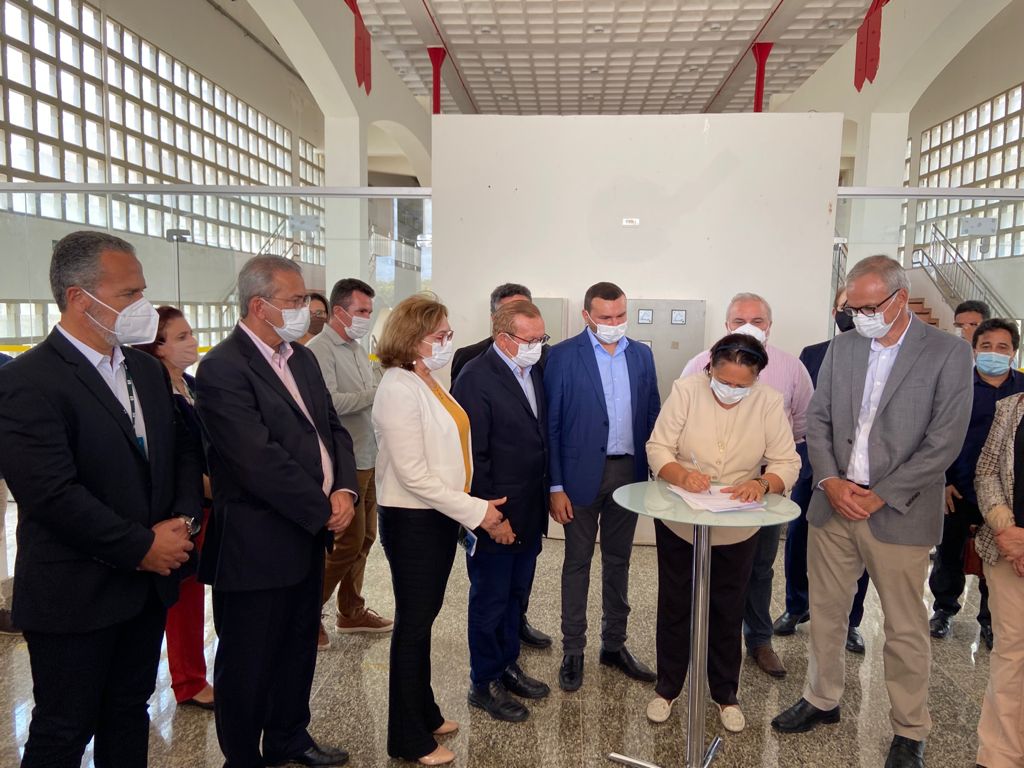Designed to bring together startups, researchers, companies and students interested in science, technology and sustainable development, the Augusto Severo Science and Technology Park (PAX) was officially implemented this Thursday (08/09). The building that will house the Park, built on land partly occupied by the Santos Dumont Institute (ISD), in Macaíba, has approximately 15 thousand square meters and will receive complementary investments of around R$8.4 million, from the Citizen Government Project, of the Executive Branch of Rio Grande do Norte.
In a ceremony held on Thursday morning, attended by Governor Fátima Bezerra; the administrative director of ISD, Jovan Gadioli; the rector of the Federal University of Rio Grande do Norte (UFRN), José Daniel Diniz; the special advisor to UFRN for PAX, Angela Paiva; the mayor of Macaíba, Emídio Júnior; as well as politicians, business leaders and representatives of entities from the productive sector of Rio Grande do Norte, the State Government and UFRN signed an agreement to adapt the spaces to the needs of the Technology Park.
At PAX, innovation hubs will be implemented in sectors considered essential to local social and economic development, such as renewable energy, mining, fishing, aquaculture, textiles, tourism, fruit growing and services. The hub will also house companies specializing in the manufacture of orthoses and prostheses for the rehabilitation of patients with various disabilities.
“This is a project that has been under construction for over eight years together with UFRN. The Santos Dumont Institute, Fapern and the State Government value institutional projects. Four mayors have joined this Technology Park project. The productive sector is also represented and has helped us to ensure that our projects generate solutions for the community. This is a socially and economically developed Rio Grande do Norte, thinking about sustainability”, stated Angela Paiva, UFRN’s special advisor for PAX. In total, the Augusto Severo Science and Technology Park brings together 13 institutions, with ISD, UFRN and the State University of Rio Grande do Norte (UERN) providing sustainability from an academic standpoint. “We work hand in hand to think about the project that aims at development based on science, technology and sustainability”, added Angela Paiva.
Investment
The investment by the Rio Grande do Norte State Government, through a loan agreement with the World Bank, was secured in 2019, but implementation faced difficulties such as issues of land ownership, management model and engineering projects that have been resolved together with UFRN. The institution, in addition to being a partner in this implementation, owns the property where the equipment will operate. The expectation is that the first phase of operations of the Park will begin in July 2022. The project has a structure of 15 thousand square meters divided into three blocks of classrooms, which can become offices and/or laboratories, an auditorium with capacity for 400 people, common areas and parking. The resources made available by the Citizen Government will cover additional works, such as adaptations to the electrical and hydraulic systems, for example.
Recognition
The space that now houses PAX was initially designed by scientist Miguel Nicolelis, chairman of the ISD Board of Directors, to be a school for training scientists. However, with the discontinuation of funding by the Federal Government, it was no longer possible to maintain the project and the building was returned to UFRN in 2018. “This will be the new address for science and technology in RN. Professor Nicolelis brought the Santos Dumont Institute to Rio Grande do Norte and Macaíba, which is a reference for Brazil and the world. This cannot go unnoticed. Nicolelis's work is part of this project”, highlighted the Secretary of State for Economic Development, Jaime Calado.
“We are partners in this project that is being developed on this campus. Professor Nicolelis was the mastermind behind this entire project that is here. It has been a thriving project since its inception. It will be one of the vectors for the development of Rio Grande do Norte. ISD continues to be enthusiastic about this new step so that PAX can become a reality in a short space of time,” stressed Jovan Gadioli, administrative director of ISD, alongside the Research Manager of the Edmond and Lily Safra International Institute of Neuroscience (IIN-ELS), Edgardo Morya.
Governor Fátima Bezerra highlighted the importance of the implementation and operation of PAX and the ideal of scientist Miguel Nicolelis, who chose Macaíba to develop his project. “Today is not just any day for Rio Grande do Norte. The step we are taking is very bold, but it renews our hope for a future of development in science and technology for Rio Grande do Norte. Nicolelis’ dream is grand. This was a space to train scientists. We are reliving that dream. We are giving this space a very noble purpose”, emphasized Fátima Bezerra.
Text: Ricardo Araújo / Ascom – ISD
Photograph: Ricardo Araujo / Ascom – ISD
Communication Office
comunicacao@isd.org.br
(84) 99416-1880
Santos Dumont Institute (ISD)
It is a Social Organization linked to the Ministry of Education (MEC) and includes the Edmond and Lily Safra International Institute of Neurosciences and the Anita Garibaldi Health Education and Research Center, both in Macaíba. ISD's mission is to promote education for life, forming citizens through integrated teaching, research and extension actions, in addition to contributing to a fairer and more humane transformation of Brazilian social reality.













